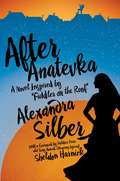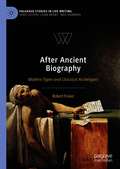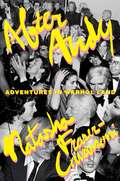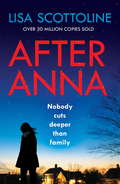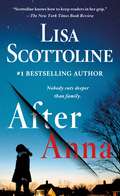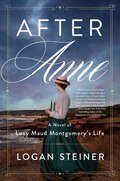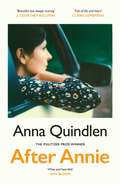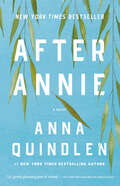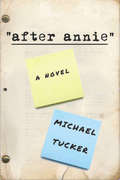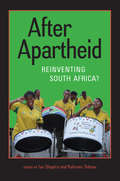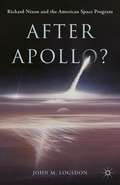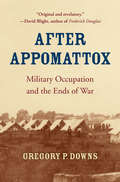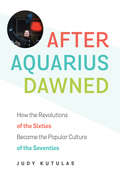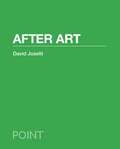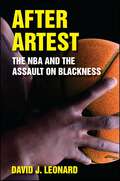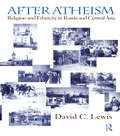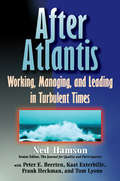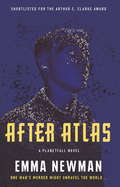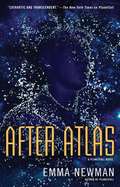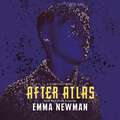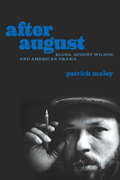- Table View
- List View
After Anatevka: A Novel Inspired By Fiddler On The Roof
by Alexandra Silber Sheldon HarnickA sweeping historical novel in the grand tradition of Russian literature that imagines what happens to the characters of Fiddler on the Roof after the curtain falls. The world knows well the tale of Tevye, the beloved Jewish dairyman from the shtetl Anatevka of Tsarist Russia. In stories originally written by Sholem Aleichem and then made world-famous in the celebrated musical Fiddler on the Roof, Tevye, his wife Golde, and their five daughters dealt with the outside influences that were encroaching upon their humble lives. But what happened to those remarkable characters after the curtain fell? In After Anatevka, Alexandra Silber picks up where Fiddler left off. Second-eldest daughter Hodel takes center stage as she attempts to join her Socialist-leaning fiancé Perchik to the outer reaches of a Siberian work camp. But before Hodel and Perchik can finally be together, they both face extraordinary hurdles and adversaries—both personal and political—attempting to keep them apart at all costs. A love story set against a backdrop of some of the greatest violence in European history, After Anatevaka is a stunning conclusion to a tale that has gripped audiences around the globe for decades.
After Ancient Biography: Modern Types and Classical Archetypes (Palgrave Studies in Life Writing)
by Robert FraserMarrying life-writing with classical reception, this book examines ancient biography and its impact on subsequent ages. Close readings of ancient texts are framed by an assessment of their influence on the age of the French Revolution and Napoleon, and on the nineteenth, twentieth, and twenty-first centuries, of responses to ancient biography of modern critics, and of its visible legacy in art and film. Crucially it asks what modern biographers can learn from their ancient predecessors. Are the challenges involved in life-writing still the same? Have working methods changed, and in what ways? What in the context of biographical writing is truth, and how are its interests best served? How is it possible, now as then, honestly to convey a life?
After Andy: Adventures in Warhol Land
by Natasha Fraser-CavassoniAfter Andy is Natasha Fraser-Cavassoni’s insider's account of working in Andy Warhol’s studio and Interview magazine, and explores Warhol’s impact on the art world, pop culture, society, and fashion—and how his iconic status gave rise to some of our most influential tastemakers today. Natasha Fraser-Cavassoni met Andy Warhol when she was sixteen, and then on and off over the years before landing in New York City at the Andy Warhol Studio, or as she calls it, “Adventures in Warhol Land.” In this witty, page-turning account, she takes readers deep into the Pop artist’s world—as well as miles into the stratosphere of the socialites, fashion icons, film stars, rock legends, and art world powerhouses who could be found in his orbit—where she worked with Fred Hughes, Brigid Berlin, Vincent Fremont, and others who were once part of the Factory clan. As the last person hired at the studio before Warhol died in 1987, Fraser-Cavassoni saw firsthand the end of an era and the establishment of a global phenomenon. From the behind-the-scenes disagreements and the assessment of his estate, which included Interview magazine and his art inventory, to the record-breaking auction of his belongings and the publication of his diaries, Fraser-Cavassoni examines the immediate aftermath of Warhol’s death and his ever-growing impact, which ranged from New York to Los Angeles and throughout Europe. Interviews with key figures of the art world and dozens of Andy intimates make After Andy and its subject more relevant than ever today.
After Anna
by Lisa ScottolineTHE NEW YORK TIMES BESTSELLING SENSATIONInternationally bestselling author Lisa Scottoline returns with this gripping, twisting thriller that will keep fans of Jenny Blackhurst's THE FOSTER CHILD and Shari Lapena's THE COUPLE NEXT DOOR guessing until the very end.Everyone deserves a second chance at happiness. Dr Noah Alderman, a widower and single father, is finally content after marrying the wonderful Maggie. And they're both thrilled when Maggie gets an unexpected chance to be a mother to Anna, the daughter she once thought she'd lost forever. But when seventeen-year-old Anna arrives everything changes - and the darkest turn of events will shatter their lives in ways no one could have imagined. What if your perfect family becomes your worst nightmare? Praise for Lisa Scottoline: "A deliciously distracting thriller...Scottoline illuminat[es] the landing strip of revelations and truths in a deliciously slow and intense way." The Washington Post on After Anna "Scottoline knows how to keep readers in her grip." The New York Times Book Review "A virtuoso of suspense, fast action, and intricate plot." The Washington Post "Scottoline is a powerhouse." David Baldacci "Scottoline writes riveting thrillers that keep me up all night, with plots that twist and turn." Harlan Coben "Lisa Scottoline is one of the very best writers at work today" Michael Connelly
After Anna
by Lisa ScottolineNobody cuts deeper than family...Dr. Noah Alderman, a widower and single father, has remarried a wonderful woman, Maggie Ippolitti, and for the first time in a long time, he and his young son are happy. <P><P>Despite her longing for the daughter she hasn’t seen since she was a baby, Maggie is happy too, and she’s even more overjoyed when she unexpectedly gets another chance to be a mother to the child she thought she'd lost forever, her only daughter Anna. <P>Maggie and Noah know that having Anna around will change their lives, but they would never have guessed that everything would go wrong, and so quickly. Anna turns out to be a gorgeous seventeen-year-old who balks at living under their rules, though Maggie, ecstatic to have her daughter back, ignores the red flags that hint at the trouble brewing in a once-perfect marriage and home. <P>Events take a heartbreaking turn when Anna is murdered and Noah is accused and tried for the heinous crime. Maggie must face not only the devastation of losing her daughter, but the realization that Anna's murder may have been at the hands of a husband she loves. In the wake of this tragedy, new information drives Maggie to search for the truth, leading her to discover something darker than she could have ever imagined. <P>Riveting and disquieting, After Anna is a groundbreaking domestic thriller, as well as a novel of emotional justice and legal intrigue. And New York Times bestselling author Lisa Scottoline will keep readers on their toes until the final shocking page. <P><b>A New York Times Bestseller</b>
After Anne: A Novel of Lucy Maud Montgomery's Life
by Logan SteinerA stunning and unexpected portrait of Lucy Maud Montgomery, creator of one of literature’s most prized heroines, whose personal demons were at odds with her most enduring legacy—the irrepressible Anne of Green Gables.“Dear old world,” she murmured, “you are very lovely, and I am glad to be alive in you.” —L. M. Montgomery, Anne of Green Gables, 1908As a young woman, Maud had dreams bigger than the whole of Prince Edward Island. Her exuberant spirit had always drawn frowns from her grandmother and their neighbors, but she knew she was meant to create, to capture and share the way she saw the world. And the young girl in Maud’s mind became more and more persistent: Here is my story, she said. Here is how my name should be spelled—Anne with an “e.”But the day Maud writes the first lines of Anne of Green Gables, she gets a visit from the handsome new minister in town, and soon faces a decision: forge her own path as a spinster authoress, or live as a rural minister’s wife, an existence she once called "a synonym for respectable slavery." The choice she makes alters the course of her life.With a husband whose religious mania threatens their health and happiness at every turn, the secret darkness that Maud herself holds inside threatens to break through the persona she shows to the world, driving an ever-widening wedge between her public face and private self, and putting her on a path towards a heartbreaking end.Beautiful and moving, After Anne reveals Maud’s hidden personal challenges while celebrating what was timeless about her life and art—the importance of tenacity and the peaceful refuge found in imagination.
After Annie: A Novel
by Anna Quindlen&‘Candid and complex – and ultimately quite hopeful&’ Claire Lombardo&‘Beautiful and deeply moving&’ J. Courtney Sullivan&‘A story of abiding hope&’ Mary Beth Keane When Annie Brown dies suddenly, her husband, her four young children and her closest friend are left to struggle without the woman who centred their lives. Bill Brown finds himself overwhelmed, and Annie&’s best friend Annemarie is lost to old bad habits without Annie&’s support. It is Annie&’s daughter, Ali, forced to try to care for her younger brothers and even her father, who manages to maintain some semblance of their former lives for them all, and who confronts the complicated truths of adulthood. Yet over the course of the next year, while Annie looms large in their memories, all three are able to grow, to change, even to become stronger and more sure of themselves. The enduring power Annie gave to those who loved her is the power to love, and to go on without her. Written in Quindlen&’s emotionally resonant voice, and with her deep and generous understanding of people, After Annie is a story that ends with hope, a beautiful novel about how adversity can change us in profound ways. Praise for Anna Quindlen &‘Leaves the reader feeling grateful, wide awake, lucky to be alive&’ Michael Chabon &‘Simply impossible to forget&’ Alice Hoffman &‘Qualities and shades of love are this writer's strong suit, and she has the unusual talent for writing about them with so much truth and heart&’ Elizabeth Jane Howard &‘Breathtaking... Quindlen writes superbly about families, grief and betrayal. I was completely mesmerised&’ Lisa Jewell &‘Engaging, immaculately constructed storytelling&’ Guardian &‘One of our most astute chroniclers of modern life&’ New York Times Book Review &‘Brave and beautiful&’ The Times &‘Her storytelling is exemplary&’ Sunday Telegraph &‘With relentless and dazzling brilliance, Quindlen grapples with the lancing pain and the swirls of disorientation experienced by anyone who has loved and lost&’ Daily Mail &‘A wise, closely observed, achingly eloquent book&’ Huffington Post &‘Overwhelmingly moving&’ New York Times
After Annie: A Novel
by Anna QuindlenNEW YORK TIMES BESTSELLER • &“Part of Quindlen&’s gift is that you don&’t just read about these characters, you inhabit them. . . . Luminous with life, hope and the power of love.&”—People (A Book of the Week Pick) &“[A] quietly revelatory and gently gleaming gem of a book.&”—The New York Times Book Review (Editors&’ Choice) Anna Quindlen&’s trademark wisdom on family, friendship, and the ties that bind us are at the center of this novel about the power of love to transcend loss and triumph over adversity, by the author of Still Life with Bread Crumbs and One True Thing.When Annie Brown dies suddenly, her husband, her children, and her closest friend are left to find a way forward without the woman who has been the lynchpin of all their lives. Bill is overwhelmed without his beloved wife, and Annemarie wrestles with the bad habits her best friend had helped her overcome. And Ali, the eldest of Annie&’s children, has to grow up overnight, to care for her younger brothers and even her father and to puzzle out for herself many of the mysteries of adult life.Over the course of the next year what saves them all is Annie, ever-present in their minds, loving but not sentimental, caring but nobody&’s fool, a voice in their heads that is funny and sharp and remarkably clear. The power she has given to those who loved her is the power to go on without her. The lesson they learn is that no one beloved is ever truly gone.Written in Quindlen&’s emotionally resonant voice and with her deep and generous understanding of people, After Annie is about hope, and about the unexpected power of adversity to change us in profound and indelible ways.
After Annie: A Novel
by Michael TuckerAn irresistible tale about love and the theater, After Annie is an astonishing first novel. Herbie Aaron is one half of a celebrity marriage. He and Annie have been famous, nobodies, and mingled with the rich and crazy. Through it all, they've been passionate lovers and fast friends. But when Annie dies of cancer, Herbie is lost. If you think this is going to be a tragic tale about grief, think again. Herbie is too cantankerous, sly, and charming to keel over. Enter Olive, a beautiful bartender who just might be a great actress; Candy, Herbie and Annie's neurotic daughter; and a woman named Billy, the tough-talking golf pro who teaches Herbie more about his psyche than about his lousy swing. After Annie is a hilarious and beautifully rendered novel about a man off the rails, battling through the middle-aged wilderness days he hoped never to face alone. It is a book that examines the inevitable passing of time with clarity and wry brilliance, and a story of surprising power.
After Annie: A Novel
by Michael TuckerAn irresistible tale about love and the theater, After Annie is an astonishing first novel. Herbie Aaron is one half of a celebrity marriage. He and Annie have been famous, nobodies, and mingled with the rich and crazy. Through it all, they've been passionate lovers and fast friends. But when Annie dies of cancer, Herbie is lost. If you think this is going to be a tragic tale about grief, think again. Herbie is too cantankerous, sly, and charming to keel over. Enter Olive, a beautiful bartender who just might be a great actress; Candy, Herbie and Annie's neurotic daughter; and a woman named Billy, the tough-talking golf pro who teaches Herbie more about his psyche than about his lousy swing. After Annie is a hilarious and beautifully rendered novel about a man off the rails, battling through the middle-aged wilderness days he hoped never to face alone. It is a book that examines the inevitable passing of time with clarity and wry brilliance, and a story of surprising power.
After Annie
by Michael TuckerAn irresistible tale about love and the theater, After Annie is an astonishing first novel. Herbie Aaron is one half of a celebrity marriage. He and Annie have been famous, nobodies, and mingled with the rich and crazy. Through it all, they've been passionate lovers and fast friends. But when Annie dies of cancer, Herbie is lost. If you think this is going to be a tragic tale about grief, think again. Herbie is too cantankerous, sly, and charming to keel over. Enter Olive, a beautiful bartender who just might be a great actress; Candy, Herbie and Annie's neurotic daughter; and a woman named Billy, the tough-talking golf pro who teaches Herbie more about his psyche than about his lousy swing. After Annie is a hilarious and beautifully rendered novel about a man off the rails, battling through the middle-aged wilderness days he hoped never to face alone. It is a book that examines the inevitable passing of time with clarity and wry brilliance, and a story of surprising power. .
After Apartheid: Reinventing South Africa?
by Ian Shapiro Kahreen TebeauDemocracy came to South Africa in April 1994, when the African National Congress won a landslide victory in the first free national election in the country's history. That definitive and peaceful transition from apartheid is often cited as a model for others to follow. The new order has since survived several transitions of ANC leadership, and it averted a potentially destabilizing constitutional crisis in 2008. Yet enormous challenges remain. Poverty and inequality are among the highest in the world. Staggering unemployment has fueled xenophobia, resulting in deadly aggression directed at refugees and migrant workers from Zimbabwe and Mozambique. Violent crime rates, particularly murder and rape, remain grotesquely high. The HIV/AIDS pandemic was shockingly mishandled at the highest levels of government, and infection rates continue to be overwhelming. Despite the country's uplifting success of hosting Africa's first World Cup in 2010, inefficiency and corruption remain rife, infrastructure and basic services are often semifunctional, and political opposition and a free media are under pressure. In this volume, major scholars chronicle South Africa's achievements and challenges since the transition. The contributions, all previously unpublished, represent the state of the art in the study of South African politics, economics, law, and social policy.
After Apollo?
by John M. LogsdonOnce the United States landed on the moon in July 1969, it was up to President Nixon to decide what to do in space after Apollo. This book chronicles the decisions he made, including ending space exploration and approving the space shuttle. Those decisions determined the character of the US human space flight program for the next forty years.
After Appomattox: Military Occupation and the Ends of War
by Gregory P. DownsThe Civil War did not end with Confederate capitulation in 1865. A second phase commenced which lasted until 1871--not Reconstruction but genuine belligerency whose mission was to crush slavery and create civil and political rights for freed people. But as Gregory Downs shows, military occupation posed its own dilemmas, including near-anarchy.
After Aquarius Dawned: How the Revolutions of the Sixties Became the Popular Culture of the Seventies
by Judy KutulasIn this book, Judy Kutulas complicates the common view that the 1970s were a time of counterrevolution against the radical activities and attitudes of the previous decade. Instead, Kutulas argues that the experiences and attitudes that were radical in the 1960s were becoming part of mainstream culture in the 1970s, as sexual freedom, gender equality, and more complex notions of identity, work, and family were normalized through popular culture--television, movies, music, political causes, and the emergence of new communities. Seemingly mundane things like watching The Mary Tyler Moore Show, listening to Carole King songs, donning Birkenstock sandals, or reading Roots were actually critical in shaping Americans' perceptions of themselves, their families, and their relation to authority. Even as these cultural shifts eventually gave way to a backlash of political and economic conservatism, Kutulas shows that what critics perceive as the narcissism of the 1970s was actually the next logical step in a longer process of assimilating 1960s values like individuality and diversity into everyday life. Exploring such issues as feminism, sexuality, and race, Kutulas demonstrates how popular culture helped many Americans make sense of key transformations in U.S. economics, society, politics, and culture in the late twentieth century.
After Art (POINT: Essays on Architecture #2)
by David JoselitHow digital networks are transforming art and architectureArt as we know it is dramatically changing, but popular and critical responses lag behind. In this trenchant illustrated essay, David Joselit describes how art and architecture are being transformed in the age of Google. Under the dual pressures of digital technology, which allows images to be reformatted and disseminated effortlessly, and the exponential acceleration of cultural exchange enabled by globalization, artists and architects are emphasizing networks as never before. Some of the most interesting contemporary work in both fields is now based on visualizing patterns of dissemination after objects and structures are produced, and after they enter into, and even establish, diverse networks. Behaving like human search engines, artists and architects sort, capture, and reformat existing content. Works of art crystallize out of populations of images, and buildings emerge out of the dynamics of the circulation patterns they will house.Examining the work of architectural firms such as OMA, Reiser + Umemoto, and Foreign Office, as well as the art of Matthew Barney, Ai Weiwei, Sherrie Levine, and many others, After Art provides a compelling and original theory of art and architecture in the age of global networks.
After Artest: The NBA and the Assault on Blackness (SUNY series on Sport, Culture, and Social Relations)
by David J. LeonardOn November 19, 2004, a fight between NBA players Ron Artest and Ben Wallace escalated into a melee involving several other players and many fans. The "Palace Brawl," writes David J. Leonard, was a seminal event, one that dramatically altered outside perceptions of the sport. With commentators decrying the hip hop or gangsta culture of players, the blackness of the NBA was both highlighted and disdained. This was a harsh blow to the league's narrative of colorblindness long cultivated by Commissioner David Stern and powerfully embodied in the beloved figure of Michael Jordan. As Leonard demonstrates, the league viewed this moment as a threat needing intervention, quickly adopting policies to govern black players and prevent them from embracing styles and personas associated with blackness. This fascinating book discloses connections between the NBA's discourse and the broader discourse of antiblack racism. Particular policy changes that seemed aimed at black players, such as the NBA dress code and the debate over a minimum age requirement, are explored.
After Atheism: Religion And Ethnicity In Russia And Central Asia (Caucasus World)
by David LewisBased on interviews with people throughout Siberia, Central Asia and European Russia about their spiritual experiences, this book brings together insights into the 'religious' worldview of those who claim to be Buddhist, Muslim, Christian, pagan or even 'atheist'. Throughout the ex-Soviet Union peoples of many different ethnic backgrounds report such experiences but often do not know how to interpret them, a position helped or hindered by the fact that at the same time these people are trying to rediscover their ethnic and cultural identity.
AFTER ATLANTIS: Working, Managing, and Leading in Turbulent Times
by Ned HamsonBased on both fundamental theory and practical experience, After Atlantis identifies a broad range of approaches that will better equip individuals and organizations not only to react in time to change but to become pro-active in creating a positive future for themselves and their organizations. It is a practical field guide to understanding and mastering turbulence within organizations and across the global marketplace. After Atlantis takes the position that no single activity will assure success. It is grounded in the most advanced, field-tested, and robust theories about innovation and leadership, and will help organizations to construct their future with meaning and to meet the needs of their customers. The international team of contributors includes Peter Beerten and Kaat Exterbille of Belgium, Tom Lyons of Ireland, and Frank Heckman of the United States.Ned Hamson has been editor of The Journal for Quality and Participation since 1985. His duties as editor there have brought him into close contact with leading organizations, consultants, and practitioners in the fields of quality and participation. Some of the foremost authorities who have contributed to the journal during his tenure include Tom Peters, Dr. W. Edwards Deming, Margaret Wheatley, Peter Senge, George Bush, and Bill Clinton. Mr. Hamson also conducts extensive research on international political economy.
After Atlas
by Emma NewmanAcclaimed author Emma Newman returns to the captivating universe she created in Planetfall with a stunning science fiction mystery where one man's murder is much more than it seems... Gov-corp detective Carlos Moreno was only a baby when Atlas left Earth to seek truth among the stars. But in that moment, the course of Carlos's entire life changed. Atlas is what took his mother away; what made his father lose hope; what led Alejandro Casales, leader of the religious cult known as the Circle, to his door. And now, on the eve of the fortieth anniversary of Atlas's departure, it's got something to do why Casales was found dead in his hotel room-and why Carlos is the man in charge of the investigation. To figure out who killed one of the most powerful men on Earth, Carlos is supposed to put aside his personal history. But the deeper he delves into the case, the more he realizes that escaping the past is not so easy. There's more to Casales's death than meets the eye, and something much more sinister to the legacy of Atlas than anyone realizes...
After Atlas: A Planetfall Novel (A Planetfall Novel #2)
by Emma NewmanAcclaimed author Emma Newman returns to the captivating universe she created in Planetfall with a stunning science fiction mystery where one man's murder is much more than it seems... Gov-corp detective Carlos Moreno was only a baby when Atlas left Earth to seek truth among the stars. But in that moment, the course of Carlos's entire life changed. Atlas is what took his mother away; what made his father lose hope; what led Alejandro Casales, leader of the religious cult known as the Circle, to his door. And now, on the eve of the fortieth anniversary of Atlas's departure, it's got something to do why Casales was found dead in his hotel room--and why Carlos is the man in charge of the investigation. To figure out who killed one of the most powerful men on Earth, Carlos is supposed to put aside his personal history. But the deeper he delves into the case, the more he realizes that escaping the past is not so easy. There's more to Casales's death than meets the eye, and something much more sinister to the legacy of Atlas than anyone realizes...From the Trade Paperback edition.
After Atlas
by Emma NewmanAcclaimed author Emma Newman returns to the captivating universe she created in Planetfall with a stunning science fiction mystery where one man's murder is much more than it seems... Gov-corp detective Carlos Moreno was only a baby when Atlas left Earth to seek truth among the stars. But in that moment, the course of Carlos's entire life changed. Atlas is what took his mother away; what made his father lose hope; what led Alejandro Casales, leader of the religious cult known as the Circle, to his door. And now, on the eve of the fortieth anniversary of Atlas's departure, it's got something to do why Casales was found dead in his hotel room-and why Carlos is the man in charge of the investigation. To figure out who killed one of the most powerful men on Earth, Carlos is supposed to put aside his personal history. But the deeper he delves into the case, the more he realizes that escaping the past is not so easy. There's more to Casales's death than meets the eye, and something much more sinister to the legacy of Atlas than anyone realizes...
After Atlas
by Emma NewmanAcclaimed author Emma Newman returns to the captivating universe she created in Planetfall with a stunning science fiction mystery where one man's murder is much more than it seems... Gov-corp detective Carlos Moreno was only a baby when Atlas left Earth to seek truth among the stars. But in that moment, the course of Carlos's entire life changed. Atlas is what took his mother away; what made his father lose hope; what led Alejandro Casales, leader of the religious cult known as the Circle, to his door. And now, on the eve of the fortieth anniversary of Atlas's departure, it's got something to do why Casales was found dead in his hotel room-and why Carlos is the man in charge of the investigation. To figure out who killed one of the most powerful men on Earth, Carlos is supposed to put aside his personal history. But the deeper he delves into the case, the more he realizes that escaping the past is not so easy. There's more to Casales's death than meets the eye, and something much more sinister to the legacy of Atlas than anyone realizes...Read by Emma Newman(p) Blackstone Audio 2018
After August: Blues, August Wilson, and American Drama
by Patrick MaleyCritics have long suggested that August Wilson, who called blues "the best literature we have as black Americans," appropriated blues music for his plays. After August insists instead that Wilson’s work is direct blues expression. Patrick Maley argues that Wilson was not a dramatist importing blues music into his plays; he was a bluesman, expressing a blues ethos through drama.Reading Wilson’s American Century Cycle alongside the cultural history of blues music, as well as Wilson’s less discussed work—his interviews, the polemic speech "The Ground on Which I Stand," and his memoir play How I Learned What I Learned—Maley shows how Wilson’s plays deploy the blues technique of call-and-response, attempting to initiate a dialogue with his audience about how to be black in America. After August further contends that understanding Wilson as a bluesman demands a reinvestigation of his forebears and successors in American drama, many of whom echo his deep investment in social identity crafting. Wilson’s dramaturgical pursuit of culturally sustainable black identity sheds light on Tennessee Williams’s exploration of oppressive limits on masculine sexuality and Eugene O’Neill’s treatment of psychologically corrosive whiteness. Today, the contemporary African American playwrights Katori Hall and Tarell Alvin McCraney repeat and revise Wilson’s methods, exploring the fraught and fertile terrain of racial, gender, and sexual identity. After August makes a significant contribution to the scholarship on Wilson and his undeniable impact on American drama.
After Augustine
by Brian StockAugustine of Hippo was the most prolific and influential writer on reading between antiquity and the Renaissance, though he left no systematic treatise on the subject. His reluctance to synthesize his views on other important themes such as the sacraments suggests that he would have been skeptical of any attempt to bring his statements on reading into a formal theory. Yet Augustine has remained the point of reference to which all later writers invariably return in their search for the roots of problems concerning reading and interpretation in the West. Using Augustine as the touchstone, Brian Stock considers the evolution of the meditative reader within Western reading practices from classical times to the Renaissance. He looks to the problem of self-knowledge in the reading culture of late antiquity; engages the related question of ethical values and literary experience in the same period; and reconsiders Erich Auerbach's interpretation of ancient literary realism. In subsequent chapters, Stock moves forward to the Middle Ages to explore the attitude of medieval Latin authors toward the genre of autobiography as a model for self-representation and takes up the problem of reading, writing, and the self in Petrarch. He compares the role of the reader in Augustine'sCity of Godand Thomas More'sUtopia, and, in a final important move, reframes the problem of European cultural identity by shifting attention from the continuity and change in spoken language to significant shifts in the practice of spiritual, silent reading in the Middle Ages and Renaissance. A richly rewarding reflection on the history and nature of reading,After Augustinepromises to be a centerpiece of discussions about the discovery of the self through literature.
